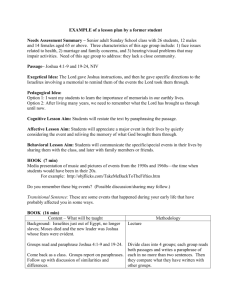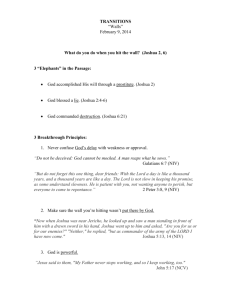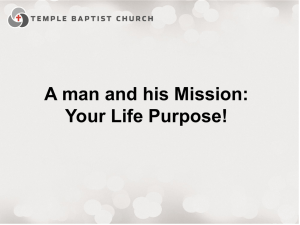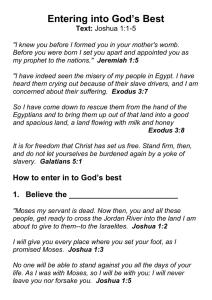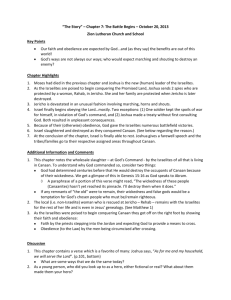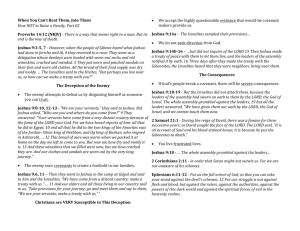07_Joshua - WordPress.com
advertisement
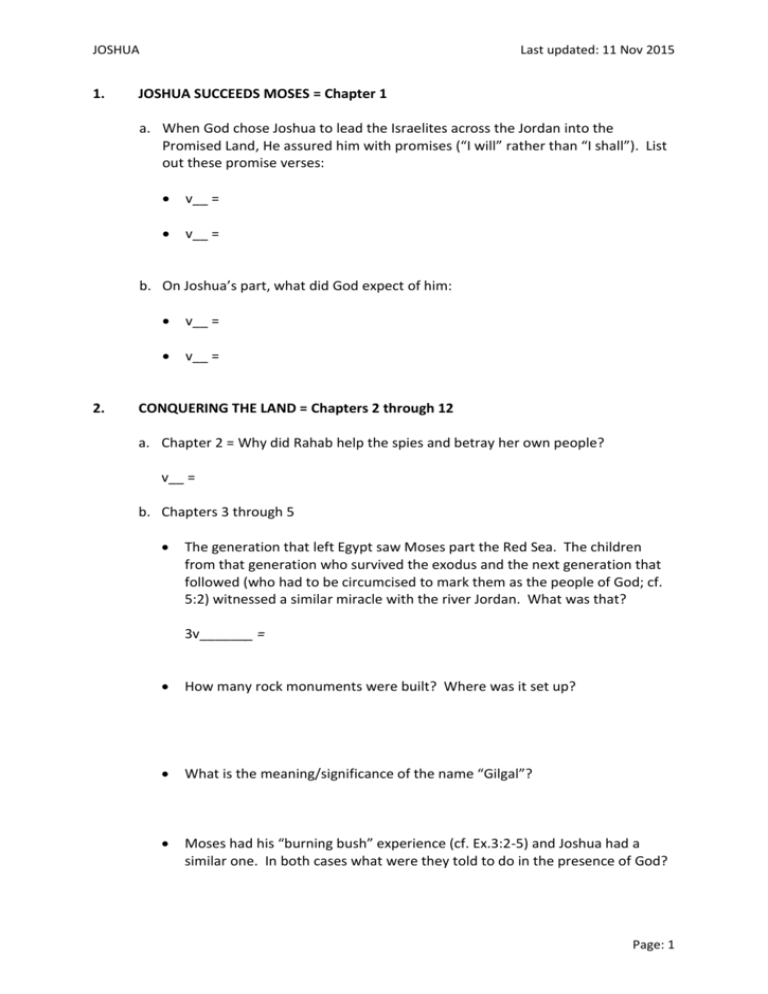
JOSHUA 1. Last updated: 11 Nov 2015 JOSHUA SUCCEEDS MOSES = Chapter 1 a. When God chose Joshua to lead the Israelites across the Jordan into the Promised Land, He assured him with promises (“I will” rather than “I shall”). List out these promise verses: v__ = v__ = b. On Joshua’s part, what did God expect of him: 2. v__ = v__ = CONQUERING THE LAND = Chapters 2 through 12 a. Chapter 2 = Why did Rahab help the spies and betray her own people? v__ = b. Chapters 3 through 5 The generation that left Egypt saw Moses part the Red Sea. The children from that generation who survived the exodus and the next generation that followed (who had to be circumcised to mark them as the people of God; cf. 5:2) witnessed a similar miracle with the river Jordan. What was that? 3v_______ = How many rock monuments were built? Where was it set up? What is the meaning/significance of the name “Gilgal”? Moses had his “burning bush” experience (cf. Ex.3:2-5) and Joshua had a similar one. In both cases what were they told to do in the presence of God? Page: 1 JOSHUA Last updated: 11 Nov 2015 c. Chapters 6 through 8 How many times in total did the Israelites march around Jericho before its walls fell? Who else suffered because of Achan’s sin? 8:30-32 = The battles of Jericho and Ai clearly illustrate the blessings and curses that Joshua read out from the Book of the Law (of Moses) on Mt Ebal, which Moses commanded in Deut.27. Read the chapter to refresh your memory. d. Chapter 9 = What should Joshua and the leaders of the Israelites have done before making a treaty with the Gibeonites? v____ = Inquired of the Lord e. Chapters 10 through 12 The conquest of the Promised Land started with the fall of two cities (Jericho and Ai) and the peace treaty with Gibeon; after which followed two campaigns. [1] Joshua's southern campaign was triggered by the treaty he made with the city of Gibeon. Five local kings went to war against Gibeon for its defection to the Israelites. Joshua’s army marched all night from Gilgal to Gibeon and defeated them. They went on and conquered all their cities (except Jerusalem). [2] Up north, the collapse of the south to Joshua spurred the powerful King Jabin of Hazor to assemble a “huge army, as numerous as the sands on the seashore” with all their troops and horses and chariots. Again, with God’s help, Joshua made a surprise attack and demolished the enemy, hamstrung their horses and burned their chariots. Joshua captured all the cities where the enemy kings had ruled and only burned Page: 2 JOSHUA Last updated: 11 Nov 2015 Hazor. Following these quick victories, a slower guerrilla war had to be waged to root out pockets of resistance. During the southern campaign … The _______________________________ stood still until Israel defeated their enemies. Most of the enemy soldiers died from ___________________ rather than from the weapons of the Israelites. 3. In conquering the land, God wanted the Israelites to completely destroy the people. How did God accomplish this purpose? In all, how many kings and their cities were conquered? DIVIDING THE LAND = Chapters 13 through 24 Page: 3 JOSHUA Last updated: 11 Nov 2015 a. The original inhabitants of the land of Canaan (collectively known as the Canaanites) comprised of seven nations. Name them. All these nations were ____________ and ____________ than the Israelites (cf. Deut.7:1). b. God promised Abraham three things in Gen.12:1-3: (1) His descendants will become a _________________ (2) They will possess the ________ (Gen.15:7,18) stretching from the river of Egypt to the Euphrates (3) Through Abraham (or more specifically, through his offspring), all the nations of the earth will be blessed. Who does this offspring refers to? cf. Gal.3:16 c. God also revealed three future events to Abraham: (1) His descendants would become ___________ (Gen.15:13) in a foreign nation for 400 years (2) Afterward God would ___________ (Gen.15:14) that nation (Egypt) and they will come out with _____________________ (Ex.12:36) (3) The land of Canaan was ___________ (Lev.18:24-25) by its inhabitants, so God will __________ them for their _______ and give the land to Abraham’s descendants but not until the ____________ (Gen.15:16) of the Amorites (and other Canaanites) was complete. d. Following the relatively quick victories in chapters 10 - 12, there were many areas still left unconquered; see 13:1-7. Why is that so according to Ex.23:29-30 and Deut.7:22? Page: 4 JOSHUA Last updated: 11 Nov 2015 e. In chapter 14, work out how many years Israel had been fighting since they crossed the Jordan using verse 10 and the following clues: Caleb was sent out as a spy during the 2nd year (cf. Num.13) of the ___ -year exodus journey (cf. Josh.5:6) from Egypt to Canaan Caleb’s age when he was a spy (was ____ years) and his present age (is ____ years) Therefore, Caleb and the Israelites have been fighting for ___ years since they entered the Promised Land. f. Although the entire land of Canaan has not been fully conquered, Joshua divided the Promised Land west of the Jordan, by faith. Fill in the names of the tribe or half-tribe or person in the land allocation: 13:8-33 = Reuben, Gad and the half-tribe of Manasseh 14:6-15 and 15:13-19 = 16:1-10 = 18:13-28 = 19:10-16 = 19:24-31 = 19:40-48 = 15:1-12, 20-62 = 17:1-18 = 19:1-9 = 19:17-23 = 19:32-39 = 19:49-51 = Note: Who did Joshua allocate land to first and who was allocated last in the list? Page: 5 JOSHUA Last updated: 11 Nov 2015 g. At the time of writing of the book of Joshua, there were pockets of resistance where the Israelites “did not drive out” or “could not dislodge” the inhabitants. Find the three references that mention this. h. From chapter 20 … How many “Cities of Refuge” were designated? Summarise what was their purpose? Notice that an Israelite can reach one of these cities by travelling about one day’s journey. i. The Levites were given cities, and the surrounding pasture lands for their animals. What was the total number of cities given to the Levites in chapter 21? j. What was the event that nearly resulted in a civil war in chapter 22? Page: 6 JOSHUA 3. Last updated: 11 Nov 2015 JOSHUA’S FAREWELL SPEECH = Chapter 23-24 a. Within chapter 23, the word “promise” or “promised” or “promises” is used five times. List down the verses where it is found. b. Joshua recalls the history of Israel’s ancestry and points out the faithfulness of God in fulfilling his promises to his people. Insert the following cross-references into the table: Gen.11:24-32; 12:1-3; 21:1-3; 36:1-8 Ex.4:27-31; 6:28-12:30; 14:19-30 Num.21:21-35; 22:2-24:25 Josh.6:1-25; 10:1-27; 11:1-15 Historical events (Date refers to lifespan of individual or event) 24:2 = Terah, the father of Abraham lived beyond the (Euphrates) River and worshiped other gods; cf. v15 24:3 = God led Abraham from beyond the (Euphrates) River to Canaan and gave him an heir – Isaac 24:4 = Isaac’s heirs were Esau (who was given the land of Seir) and Jacob. Jacob and his sons became foreigners in Egypt. 24:5 = Moses and Aaron were sent by God, who afflicted Egypt (with the Ten Plagues), and they brought the Israelites out of slavery. 24:6-7 = When the Egyptians pursued them, God caused darkness to separate them then he drowned the Egyptians in the Red Sea. 24:8 = The land of the Amorites (King Sihon and King Og), east of the Jordan, was given to the Israelites. 24:9-10 = Balak, the king of Moab, hired Balaam to curse Israel but God made him bless them instead. 24:11-12 = Jericho was the first conquest west of the Jordan followed by two major offensives against two powerful kings - King Adonizedek of Jerusalem in the south and King Jabin of Hazor in the north. Date Crossreference 2167BC – 1992BC 2067BC – 1887BC 2007BC – 1827BC 1527BC – 1407BC 1447BC 1408BC 1407BC – 1400BC Page: 7 JOSHUA Last updated: 11 Nov 2015 c. What was Joshua’s purpose in his farewell speech? A way to answer this question is to list down all the verses in chapter 24 and count the number of occurrences of the words “worship”, “serve,” “obey” (and their derivatives). The first three verses have been done for you. v2 = worshipped v14 = serve x 2, worshipped v15 = serving, served, serve x 2 Joshua’s purpose was to … Page: 8
